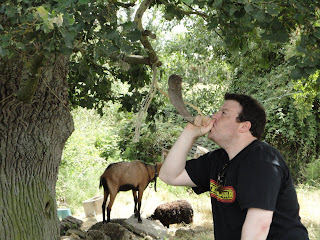From the exterior we see the gorgeous home of the Maudet-Cousin family and their duck farm, Ferme Auberge. Our eyes glance over the beautifully manicured lawn and a playful picture of an animated duck holding an umbrella and basket filled with adorable ducklings.
How delightful!
Do tell Chefonz, what is the nature of this visit?
GAVAGE!!! GAVAGE!!!
The act of force-feeding ducks in order to plump their livers full in preparation of their death and the distribution of foie-gras.
But guess what...foie is deeeelish!
In order for me to make an educated opinion on this hot-button issue, I felt it was my responsibility to understand the process, observe, and then make a judgement predicated on my findings.
The following is directly from a "statement" that the fine folks at the Foie Gras et Ferme Auberge provided to our group:
"The ducklings arrive at the farm when they are 3-4 weeks old. All the ducks are male because they do not make a noise!!! Male ducks also have bigger livers. For the next nine weeks, they will be left in fields to feel free to drink and eat whenever and whatever they want. At the end of their 13 weeks, they are taken from the field and they go into the gavage room where they are fed twice a day. After two weeks in the gavage room, they will be humanely killed to become delicious foie gras, various cuts of meat, and numerous pate conserves. We can not call our products organic because our ducks have been fed maize so we like to call them HAPPY DUCKS because they have been free to roam our fields and they have a carefree life."
I must say this...the married couple that own and run this farm love their livestock. They took great pride in the care of their ducks and they take equal pride in the quality of their final product. Their foie is sold throughout France to a number of Michelin rated restaurants...the foie dish that we made with Chef Eric a handful of days ago came from this exact farm.
The picture below is a painting of the original owner working with her ducks before the implementation of mechanical gavaging (i'm pretty sure that's not a real word).
























